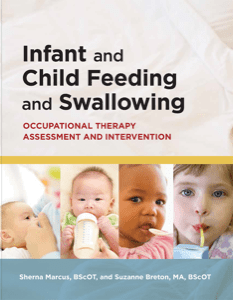Abstract
Infant and child feeding and swallowing are complex processes that require integrating motor, sensory, neurological, cardiorespiratory, and gastrointestinal systems, and they are also sensitive to the child's environment and the parent-child feeding relationship. Occupational therapy practitioners are experts in the areas of motor control, sensory processing, and swallowing function, making them valuable members of the teams caring for these children.
This text provides evidence-based information on how feeding issues develop and present, clinical assessment, and intervention. Drawing on decades of clinical experience and current evidence, this text provides practical strategies to assess and address complex feeding and swallowing problems in infants and children. This text also includes downloadable parent handouts and forms that can be used for documentation and evaluation. Comprehensive and practical, this book guides practitioners through the careful clinical decision making this vulnerable population requires.
Details
Table of Contents
Infant and Child Feeding and Swallowing: Occupational Therapy Assessment and Intervention
-
Front Matter
i2

-
1. Overview of Occupational Therapy and Pediatric Feeding
116

-
2. Development of Oral-Motor Skills
722

-
3. Clinical Feeding Assessment
2136

-
4. Difficulty Breastfeeding and Bottle-Feeding
3954

-
5. Beyond Breastfeeding and Bottle-Feeding: Difficulty Transitioning to Purees, Solid Foods, and Cup Drinking
6378

-
6. Swallowing Impairment
8196

-
7. Gastroesophageal Reflux and Other Gastrointestinal Issues
131146

-
8. Feeding Aversion and Transitioning From Tube to Oral Feeding
153168

-
Appendix A. Specialized Knowledge and Skills in Feeding, Eating, and Swallowing for Occupational Therapy Practice
175190

-
Appendix B. Specialized Knowledge and Skills for Occupational Therapy Practice in the Neonatal Intensive Care Unit
197212

-
Subject Index
213228

-
Citation Index
219234

